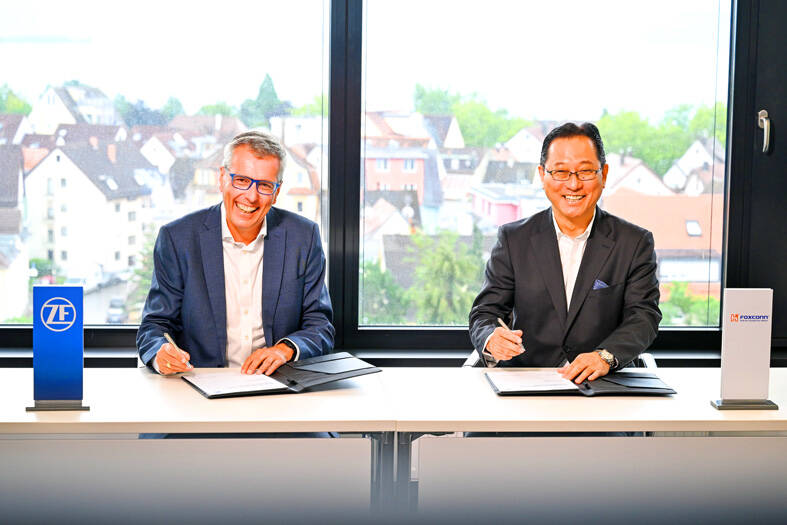Hon Hai Technology Group (鴻海科技集團) plans to acquire a 50 percent stake in a ZF Friedrichshafen AG car axle system assembly unit as the Taiwanese conglomerate seeks to accelerate its diversification into the top-tier automotive supply chain.
The strategic investment, which could cost up to 560 million euros (US$620 million), would deepen Ho Hai’s partnership with ZF Friedrichshafen, also known as ZF Group, which is the world’s third-largest tier-1 automotive supplier, the tech firm said yesterday.
Hon Hai, also known as Foxconn Technology Group (富士康科技集團) internationally, said the deal is expected to be closed in six to nine months.

Photo courtesy of Hon Hai Precision Industry Co
ZF Chassis Modules GmbH is the world’s biggest car axle maker, commanding a 26 percent share of the world’s car axle market, which was valued at 16 billion euros in 2021.
The company has an enterprise value of about 1 billion euros, and counts Mercedes-Benz Group, BMW AG and Stellantis NV as its top three customers, the companies said in a joint statement.
The partnership would leverage both firm’s capabilities and expand the range of product offerings in both the internal combustion engine and electric vehicle space, the statement said.
“We are also keen to explore more partnership opportunities with the ZF Group in the broader transportation and mobility space,” Hon Hai chairman Young Liu (劉揚偉) said in the statement.
ZF Chassis, serving global premium and volume car manufacturers, is represented at 25 locations worldwide. It has approximately 3,300 employees, of which 100 are in Germany.
The unit’s sales are expected to exceed 4 billion euros this year.
“With Foxconn, we have gained a strong strategic partner with whom we can open up new perspectives and opportunities for the ZF Chassis Modules GmbH,” ZF Group CEO Holger Klein said in the statement.

Taiwan Semiconductor Manufacturing Co (TSMC, 台積電) yesterday said that its investment plan in Arizona is going according to schedule, following a local media report claiming that the company is planning to break ground on its third wafer fab in the US in June. In a statement, TSMC said it does not comment on market speculation, but that its investments in Arizona are proceeding well. TSMC is investing more than US$65 billion in Arizona to build three advanced wafer fabs. The first one has started production using the 4-nanometer (nm) process, while the second one would start mass production using the

When an apartment comes up for rent in Germany’s big cities, hundreds of prospective tenants often queue down the street to view it, but the acute shortage of affordable housing is getting scant attention ahead of today’s snap general election. “Housing is one of the main problems for people, but nobody talks about it, nobody takes it seriously,” said Andreas Ibel, president of Build Europe, an association representing housing developers. Migration and the sluggish economy top the list of voters’ concerns, but analysts say housing policy fails to break through as returns on investment take time to register, making the

‘SILVER LINING’: Although the news caused TSMC to fall on the local market, an analyst said that as tariffs are not set to go into effect until April, there is still time for negotiations US President Donald Trump on Tuesday said that he would likely impose tariffs on semiconductor, automobile and pharmaceutical imports of about 25 percent, with an announcement coming as soon as April 2 in a move that would represent a dramatic widening of the US leader’s trade war. “I probably will tell you that on April 2, but it’ll be in the neighborhood of 25 percent,” Trump told reporters at his Mar-a-Lago club when asked about his plan for auto tariffs. Asked about similar levies on pharmaceutical drugs and semiconductors, the president said that “it’ll be 25 percent and higher, and it’ll

CHIP BOOM: Revenue for the semiconductor industry is set to reach US$1 trillion by 2032, opening up opportunities for the chip pacakging and testing company, it said ASE Technology Holding Co (日月光投控), the world’s largest provider of outsourced semiconductor assembly and test (OSAT) services, yesterday launched a new advanced manufacturing facility in Penang, Malaysia, aiming to meet growing demand for emerging technologies such as generative artificial intelligence (AI) applications. The US$300 million facility is a critical step in expanding ASE’s global footprint, offering an alternative for customers from the US, Europe, Japan, South Korea and China to assemble and test chips outside of Taiwan amid efforts to diversify supply chains. The plant, the company’s fifth in Malaysia, is part of a strategic expansion plan that would more than triple